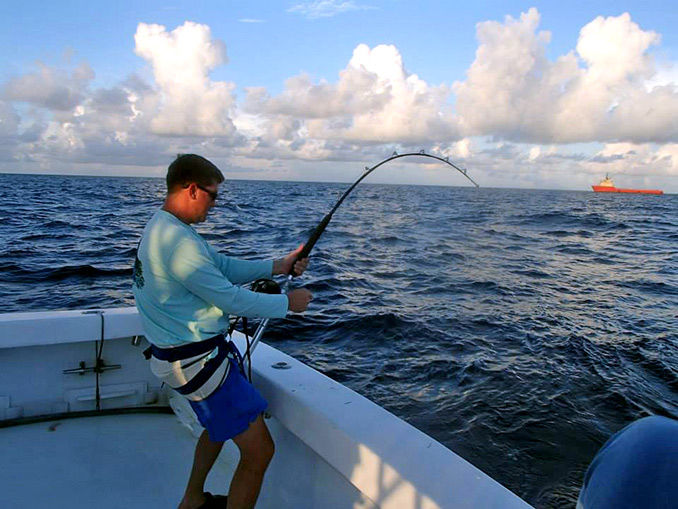Exploring the Depths: Uncovering the Perils of Deep Sea Fishing
- Flying Fishman
- Feb 25
- 3 min read
Deep sea fishing is more than just a sport; it's an adventure that attracts many enthusiasts eager to hook big fish. However, hidden beneath the excitement are real risks that require attention and preparation. In this piece, we will highlight the dangers of deep sea fishing, present essential safety practices for anglers, and address the significant environmental impact of this activity.

Hazards of Deep Sea Fishing
The thrill of pursuing large catches can overshadow the potential hazards that come with deep sea fishing. Weather is one of the biggest threats. Rough seas can roll in quickly. In fact, over 40% of maritime accidents stem from sudden weather changes, making it essential to stay alert. High waves and stormy winds can jeopardize the safety of everyone onboard.
Navigating these vast waters presents another challenge. While experienced anglers rely on GPS and sonar, the potential for equipment malfunction or miscalculation is always present. Statistics reveal that nearly 60% of boat accidents happen because of navigational errors, such as getting lost. This emphasizes the importance of honing navigation skills and having backup systems in place.
Equipment-related injuries also represent a serious risk. Sharp hooks, heavy fishing gear, and machinery can cause accidents. Reports indicate that more than 1,000 injuries occur each year due to improper handling of fishing equipment. Thus, mastering safe practices when using this gear can significantly reduce the likelihood of accidents.
Additionally, interactions with dangerous sea life can be perilous. Species such as sharks and jellyfish can pose threats, especially if mishandled. For example, an estimated 50 to 100 swimmers are stung by jellyfish every year, highlighting the need for proper education on dealing with these encounters.
Safety Measures for Deep Sea Anglers
To minimize risks while deep sea fishing, anglers must adopt several crucial safety practices.
Proper Gear: Life jackets, flares, and a well-stocked first aid kit are essential for safety. Research shows that having life vests accessible can triple survival rates in emergencies.
Weather Awareness: Always check the weather conditions before departing. By choosing to fish in calm conditions, you reduce potential dangers significantly. A reported 70% of fishing accidents occur in poor weather.
Communicate Plans: Inform someone on land about your fishing itinerary and estimated return. This simple step can be lifesaving, as help can be summoned more quickly in case of emergencies.
Team Efforts: Going out in groups enhances safety. Whether it's sharing responsibilities or providing immediate assistance during mishaps, teamwork is invaluable.
Technology Use: Rely on devices such as GPS and communication tools. Regularly maintaining and checking these devices can prevent them from failing when they are needed most.
Training in essential skills, like survival techniques and understanding weather patterns, can also be crucial. Many organizations provide tailored courses that can equip you with life-saving knowledge.
Environmental Impact of Deep Sea Fishing
The effects of deep sea fishing extend beyond immediate safety concerns into the realm of environmental challenges that must not be overlooked.
Overfishing is one of the most pressing issues damaging ocean ecosystems. For instance, the depletion of fish populations, such as cod in the North Atlantic, has led to a 70% decline in their numbers over the past 40 years. This disruption can have cascading effects on marine life, impacting everything from food chains to habitat health.
Fishing methods like bottom trawling are particularly harmful, as they can obliterate entire seabed ecosystems. A significant study estimated that bottom trawling destroys over 50% of coral reefs in heavily fished areas, with recovery taking decades.
Another major issue is bycatch, which refers to the unintentional capture of non-target species. It is estimated that bycatch accounts for 40% of the global catch, resulting in the deaths of millions of marine animals annually. Therefore, adopting more selective fishing practices is essential for protecting vulnerable species.
The carbon footprint of deep sea fishing is another factor to consider. Research indicates that recreational fishing boats contribute significantly to greenhouse gas emissions due to fuel consumption. Thus, anglers should actively seek sustainable practices.
Implementing strategies such as catch limits and seasonal closures can effectively reduce environmental impacts. Local conservation programs also welcome angler participation, creating opportunities to contribute positively.
Embracing the Adventure Responsibly
Deep sea fishing is undeniably exciting, offering challenges and rewards to those who pursue it. However, awareness of risks, adherence to safety practices, and recognition of environmental impacts are essential for a responsible experience.
By respecting the ocean and promoting sustainability, we pave the way for future generations to enjoy deep sea fishing and protect the precious marine ecosystems.
